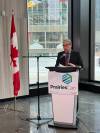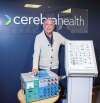At-home sleep tests to tackle backlog
Local company’s technology tapped to help speed sleep disorder diagnosis
Advertisement
Read this article for free:
or
Already have an account? Log in here »
To continue reading, please subscribe:
Monthly Digital Subscription
$1 per week for 24 weeks*
- Enjoy unlimited reading on winnipegfreepress.com
- Read the E-Edition, our digital replica newspaper
- Access News Break, our award-winning app
- Play interactive puzzles
*Billed as $4.00 plus GST every four weeks. After 24 weeks, price increases to the regular rate of $19.95 plus GST every four weeks. Offer available to new and qualified returning subscribers only. Cancel any time.
Monthly Digital Subscription
$4.99/week*
- Enjoy unlimited reading on winnipegfreepress.com
- Read the E-Edition, our digital replica newspaper
- Access News Break, our award-winning app
- Play interactive puzzles
*Billed as $19.95 plus GST every four weeks. Cancel any time.
To continue reading, please subscribe:
Add Free Press access to your Brandon Sun subscription for only an additional
$1 for the first 4 weeks*
*Your next subscription payment will increase by $1.00 and you will be charged $16.99 plus GST for four weeks. After four weeks, your payment will increase to $23.99 plus GST every four weeks.
Read unlimited articles for free today:
or
Already have an account? Log in here »
Hey there, time traveller!
This article was published 23/01/2023 (1119 days ago), so information in it may no longer be current.
More than 5,000 Manitobans are waiting in a pandemic-era backlog for diagnostic sleep studies — and a private business is ready to tackle the list.
Cerebra, a Winnipeg-based medical technology company, signed a contract with the province to facilitate 1,000 in-home studies.
“We expect to be getting patients very shortly,” said Patrick Crampton, Cerebra’s president.

JESSICA LEE / WINNIPEG FREE PRESS
Cerebra president Patrick Crampton, holding some of the company’s in-home sleep test technology, expects to be getting patients soon after signing a contract with the province.
He couldn’t say when the business would receive referrals — that depends on the province. However, Cerebra will begin circulating its equipment on the province’s behalf “in early 2023,” according to its news release.
“(Our system) basically brings all of the diagnostic information that you would normally have to get in an overnight stay in a sleep lab,” Crampton said.
The company launched in 2015. It sends Health Canada-approved polysomnography tests to customers, who track their sleep at home for a night. Results can indicate sleep apnea, periodic limb movement disorder, insomnia and other sleep issues.
“I think it puts Manitoba at the forefront of sleep management and sleep diagnostic technology,” Crampton said.
Cerebra applied to a province-issued call for applications regarding supply arrangements last fall.
The province did not answer how much it’s spending on its contract with Cerebra, when it will begin referring patients or how long it will take for patients to get results, once they’ve been referred to Cerebra.
Various backlogs in the health-care sector — from angiogram tests to knee replacement surgeries — have plagued the province. Wait lists increased during the pandemic.
Manitoba has sent patients to other provinces for various surgeries and has said it’s considering using the Mayo Clinic in the United States.
Doctors Manitoba estimates the wait list for diagnostic sleep tests doubled during the pandemic. The entity first raised its concerns in November 2021.
“Undiagnosed and untreated sleep disorders can have serious impacts on patient’s (sic) physical and mental health,” a Doctors Manitoba spokesperson wrote in a statement.
Disorders with breathing problems can lead to respiratory or heart failure.
Doctors Manitoba learned about the third-party contract for sleep disorder studies last week, according to the spokesperson. It’s “taking a closer look” with physicians who request tests for patients, and specialists who conduct the tests.
“Our main concern with any new third-party contract is the potential for it to create duplication, fragmentation, or inefficiencies in the delivery of care for patients,” the spokesperson wrote.
“What matters most to physicians is that their patients can obtain the right procedure, in a timely way, that is well-coordinated with the rest of the care they receive,” they continued.
Cerebra’s system includes a full suite of sensors. There’s a cannula to measure airflow, an “effort belt” for the upper stomach to track breathing, leg sensors to watch movement. A head unit with electrodes monitors brainwaves, and eye and chin action; a wrist oximeter detects pulse and blood oxygen levels.
“(It’s like) a complete physical for your sleep,” Crampton analogised.
The technology is wireless. Cerebra sends a tablet which offers instruction on how to apply the equipment.
Results are then scored by a technician and sent to a doctor for interpretation.
“The province is looking for support,” Crampton said. “We’re… just super excited to help Manitobans.”
The province has spent $13.7 million on the Request for Supply Arrangement process, which is how Cerebra became involved, a provincial spokesperson noted.
“Last year, our government procured over 13,000 procedures more than the health care system’s usual capacity,” they wrote.
Another 20,000 procedures — spanning a variety of services — will be contracted out to tackle the backlogs, the spokesperson added.
They noted a number of government initiatives to boost Manitoba’s health-care system, including $50 million to increase Health Sciences Centre’s surgical and diagnostic capacity by 25 per cent and $141 million to redevelop St. Boniface Hospital’s emergency room.
“If we want to talk about preventative health, sleep is right at the start,” Crampton said.
“Healthy sleep impacts so many long-term conditions. That’s why we’re passionate about getting this technology out into the hands of doctors and patients, just to help move that forward.”
The 30-person business sends its technology across Canada and is used clinically, Crampton said. The company received U.S. Food and Drug Administration clearance last summer; it’s now sending its products south.
Around 25 universities and research labs are outfitted with Cerebra equipment, Crampton added.
Dr. Magdy Younes, a University of Manitoba professor emeritus, developed the technology. Younes researches respirology, critical care medicine and sleep medicine.
gabrielle.piche@winnipegfreepress.com

Gabrielle Piché reports on business for the Free Press. She interned at the Free Press and worked for its sister outlet, Canstar Community News, before entering the business beat in 2021. Read more about Gabrielle.
Every piece of reporting Gabrielle produces is reviewed by an editing team before it is posted online or published in print — part of the Free Press‘s tradition, since 1872, of producing reliable independent journalism. Read more about Free Press’s history and mandate, and learn how our newsroom operates.
Our newsroom depends on a growing audience of readers to power our journalism. If you are not a paid reader, please consider becoming a subscriber.
Our newsroom depends on its audience of readers to power our journalism. Thank you for your support.






